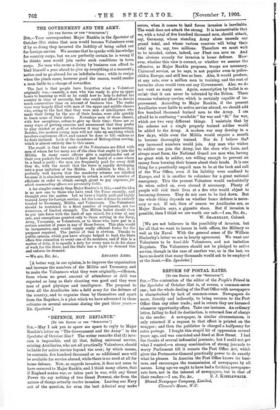THE GOVERNMENT AND THE ARMY.
[To THE EDITOR OP THE "SPECTATOR."]
SIR,—Your correspondent Major Rankin in the Spectator of October 31st states that men would become Volunteers even if by so doing they incurred the liability of being called out for foreign service. We assume that he speaks with knowledge for country corps, but we are perfectly certain he is wrong if he thinks men would join under such conditions in town corps. No man who earns a living by business can afford to bind himself a year ahead to give up everything at a moment's notice and to go abroad for an indefinite time ; while to resign when the pinch came, however good the reason, would render a man liable to a charge of cowardice.
The fact is that people have forgotten what a Volunteer originally was,—namely, a man who was ready to give up spare hours to learning as well as he could how to help to defend his country in time of necessity, but who could not afford to devote much consecutive time on account of business ties. The ranks were very largely filled with men of the upper and middle classes who, owing to the fact that they were men of intelligence who made their living by the use of their brains, were able quickly to learn some of their duties. Nowadays men of those classes, with few exceptions, refuse to give up their time: there are so many ways of getting exercise and amusement that they prefer to play cricket or golf, or whatever it may be, to manceuvring. Besides, the modern young man will not take up anything which involves continuous effort, and cannot be done or left undone as he feels inclined. Look at the decadence of Metropolitan rowing, which is almost entirely due to this cause.
The result is that the ranks of the Volunteers are filled with men of whom far too many are of the class that ought to join the Militia. In many cases officers give a capitation-fee out of their own pockets for recruits (I have just heard of a case where 69. a head 19 paid) ; the men are frequently paid for every drill they do, with the result that the force is rapidly developing into a poor imitation of the Militia. In addition to this, it is perfectly well known that the musketry returns are falsified because it is absolutely necessary to return a certain number of efficients in order to obtain enough grant to pay expenses, for which commanding officers are personally liable.
A far simpler remedy than Major Rankin's is this,—and the idea is no new one to those who have read the Times recently, and thought over the matter. Let us have a highly paid and highly trained Army for foreign service; let the home defence be entirely trusted to Yeomanry, Militia, and Volunteers. The Volunteers should be restricted to a fixed number of regiments, not teo numerous, of limited strength. The Militia ballot should then be put into force with the limit of age raised, for a time at any rate, and exemptions granted only to those serving in the Navy, Army, Yeomanry, or Volunteers, or to those who have put in a certain number of years in any of those forces. This plan would be inexpensive, and would supply really efficient forces for the purposes required. The justice of this is obvious. Thanks to public opinion, which you have always helped to lead, the State offers free education to every one of its members, and if this is a matter of duty, it is equally a duty for every man to do his share of work for the State, and the State has a right to demand this and enforce its demand.
[A better way, in our opinion, is to improve the organisation and increase the numbers of the Militia and Yeomanry, and to make the Volunteers what they were originally,—riflemen, from whom no great amount of attendance at drill was expected as long as their shooting was good and they were men of good physique and intelligence. The proposal to form all the Auxiliaries into a field army for the defence of the country, and to organise them by themselves and apart from the Regulars, is a plan which we have advocated in these columns on several occasions during the past three years.— ED. Spectator.]






























































 Previous page
Previous page